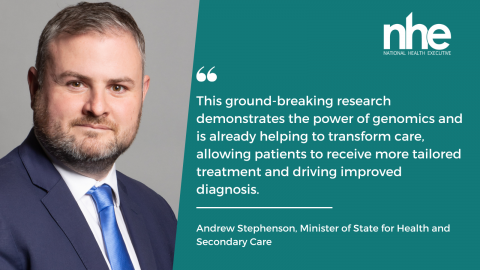A landmark new national study has revealed that combing routine clinical data with whole genome sequence data can help doctors better tailor diagnoses and care for cancer patients.
As part of the largest undertaking of its kind, researchers analysed over 30 different types of tumours from more than 13,000 patients.
After looking at genomic data alongside generic health data – such as the last five years’ worth of hospital visits and treatments – scientists were able to identify genetic changes in cancer which helped improve patient outcomes.
For example, in over 90% of brain tumours as well as more than 50% of colon and lung cancers, researchers were able to detect genetic changes that guided decisions about surgery or specific treatments.
The study, which has been published in Nature Medicine, was led by:
- Genomics England
- NHS England
- Queen Mary University of London
- University of Westminster
- Guy’s and St Thomas’ NHS Foundation Trust

The research also uncovered different patterns in the genetic changes that could explain patient responses to treatment or predict future outcomes.
Genomics England’s Dr Nirupa Murugaesu said: “We are showing how cancer genomics can be incorporated into mainstream cancer care across a national health system and the benefits that can bring patients.”
Dr Murugaesu, who is also an oncology consultant at Guy’s and St Thomas’, continued: “By collecting long-term clinical data alongside genomic data, the study has created a first-of-its-kind resource for clinicians to better predict outcomes and tailor treatments, which will allow them to inform, prepare, and manage the expectations of patients more effectively.”
The study was conducted using data collected from the 100,000 Genomes Project.
“The 100,000 Genomes Project paved the way for delivering whole genome sequencing in cancer,” explained Genomics England’s scientific director for cancer, Dr Alona Sosinsky. “This technology opens tremendous opportunities for precision oncology.”
Queen Mary University of London’s vice principal for health, Professor Sir Mark Caulfield, said that the study shows how the NHS can move away from a ‘one size fits all’ approach in cancer care and into more precise, personalised healthcare.
Overall, the research team says the results of the study support the increased use of genomic testing in cancer care through the NHS Genomic Medicine Service.
The use of genomics will be the centre of a leaders debate at National Health Executive’s upcoming life sciences event. Click here to register and learn more about how the NHS is harnessing the latest scientific discoveries to improve patient care.
Image credit: iStock



















